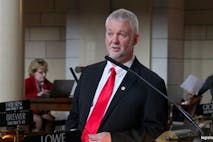
Research shows Catholic support for IVF declines once Church teaching is understood
Angeline Tan
·
How not to advance life in the Senate
Did a Republican senator really just try to turn a vote on flood insurance into a battle over abortion?
It sounds like the sort of bogus charge pro-lifers face every day, but this time, it appears to be true. The Senate is considering a measure concerning funding of the National Flood Insurance program, a non-controversial bill expected to win bipartisan support. But Sen. Rand Paul (R-KY) has attempted to attach to the bill an amendment recognizing the personhood of unborn babies from fertilization onward.
In response, Senate Majority Leader Harry Reid (D-NV) says he’ll block the bill until the amendment is gone:
“I am not going to put up with that on flood insurance. I can be condemned by outside sources; my friends can say, ‘Let them have a vote on it.’ There will not be a vote on that on flood insurance. We’ll either do flood insurance with the amendments that deal with flood insurance, or we won’t do it. We’ll have an extension.”
Reid has allowed Republicans to attach unrelated amendments to other important bills in the past few months. Most notably, he let the Senate vote on a contraception-related amendment, proposed by Sen. Roy Blunt (R-Mo.), to a transportation bill. But Reid called Paul’s measure “ridiculous” and “outlandish,” and asked Republicans to deal with him on “their side of the aisle.”
In response, Paul says he’s “just trying to get a vote for people who elected me”:
Article continues below
Dear Reader,
In 2026, Live Action is heading straight where the battle is fiercest: college campuses.
We have a bold initiative to establish 100 Live Action campus chapters within the next year, and your partnership will make it a success!
Your support today will help train and equip young leaders, bring Live Action’s educational content into academic environments, host on-campus events and debates, and empower students to challenge the pro-abortion status quo with truth and compassion.
Invest in pro-life grassroots outreach and cultural formation with your DOUBLED year-end gift!
“Can you believe that they’re exasperated with me?” he said, responding to criticism of his attempt to attach the unrelated amendment. “If [Reid will] give me a freestanding vote, I’ll take a freestanding vote any time.”
I sympathize with pro-life lawmakers struggling to draw attention to our cause in a Senate still controlled by the right to life’s opponents. And symbolic votes on such amendments can sometimes be useful for doing so (for instance, attaching one to an anti-discrimination bill is a good way of exposing how selective liberals are about equality).
But ultimately, I have to reiterate that good government requires legislation’s various provisions to have some logical connection to one another. Simply put, no logical connection exists between abortion and flood insurance. Senators who want to speak out against abortion on the floor don’t need a specific pro-life measure to be under consideration, and whatever symbolic good a vote might do will be outweighed by Democrat and media complaints about Paul hijacking bipartisan business in the name of an unrelated agenda.
In fact, it’s because the amendment is so off-topic that it also lacks symbolic value. I’m all for holding votes on long-shot legislation purely to make politicians take stands they’ll have to publicly justify, even if it is known in advance that the bill won’t become law. But no politicians who oppose this amendment, or avoid the vote entirely, will have to account for their decision in abortion-related terms. They won’t even have to mention abortion. Their excuse comes pre-packaged: “I wanted to stick to the people’s business without getting distracted by unrelated issues, especially hot-button moral issues that can be given the attention they deserve only in standalone debates.” Pro-life political junkies will know who’s snowing us, but there would be nothing in such an explanation that would arouse the average undecided voter’s suspicion.
Pro-life lawmakers need to be aggressive and creative in identifying opportunities for advancement, but such sentiments should be tempered with common sense so that even the best intentions don’t become useless or counterproductive.
Live Action News is pro-life news and commentary from a pro-life perspective.
Contact editor@liveaction.org for questions, corrections, or if you are seeking permission to reprint any Live Action News content.
Guest Articles: To submit a guest article to Live Action News, email editor@liveaction.org with an attached Word document of 800-1000 words. Please also attach any photos relevant to your submission if applicable. If your submission is accepted for publication, you will be notified within three weeks. Guest articles are not compensated (see our Open License Agreement). Thank you for your interest in Live Action News!

Angeline Tan
·
Politics
Tabitha Goodling
·
Politics
Nancy Flanders
·
Politics
Bridget Sielicki
·
Politics
Stefano Gennarini, J.D. and Kelly Heilman, J.D.
·
Politics
Bridget Sielicki
·
Guest Column
Calvin Freiburger
·
Abortion Pill Reversal
Calvin Freiburger
·
Guest Column
Calvin Freiburger
·
Abortion Pill Reversal
Calvin Freiburger
·
Activism
Calvin Freiburger
·